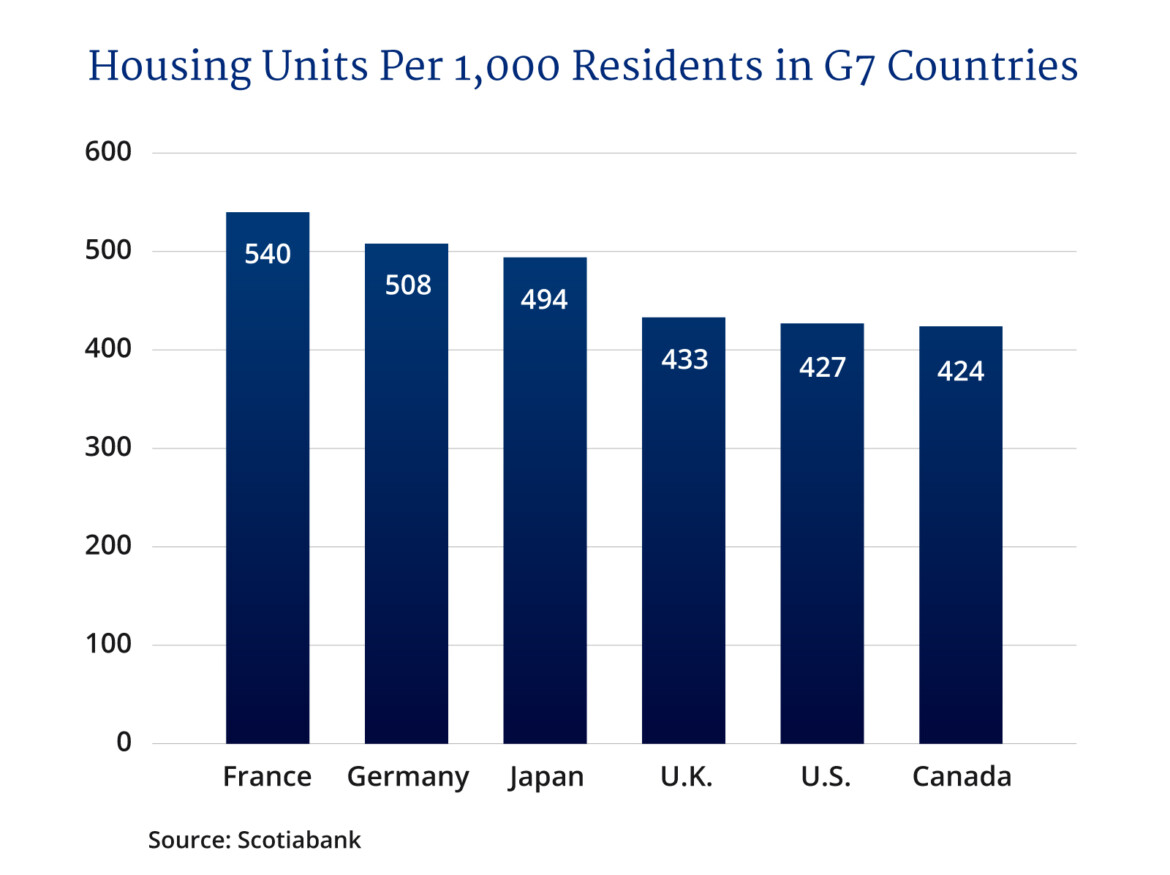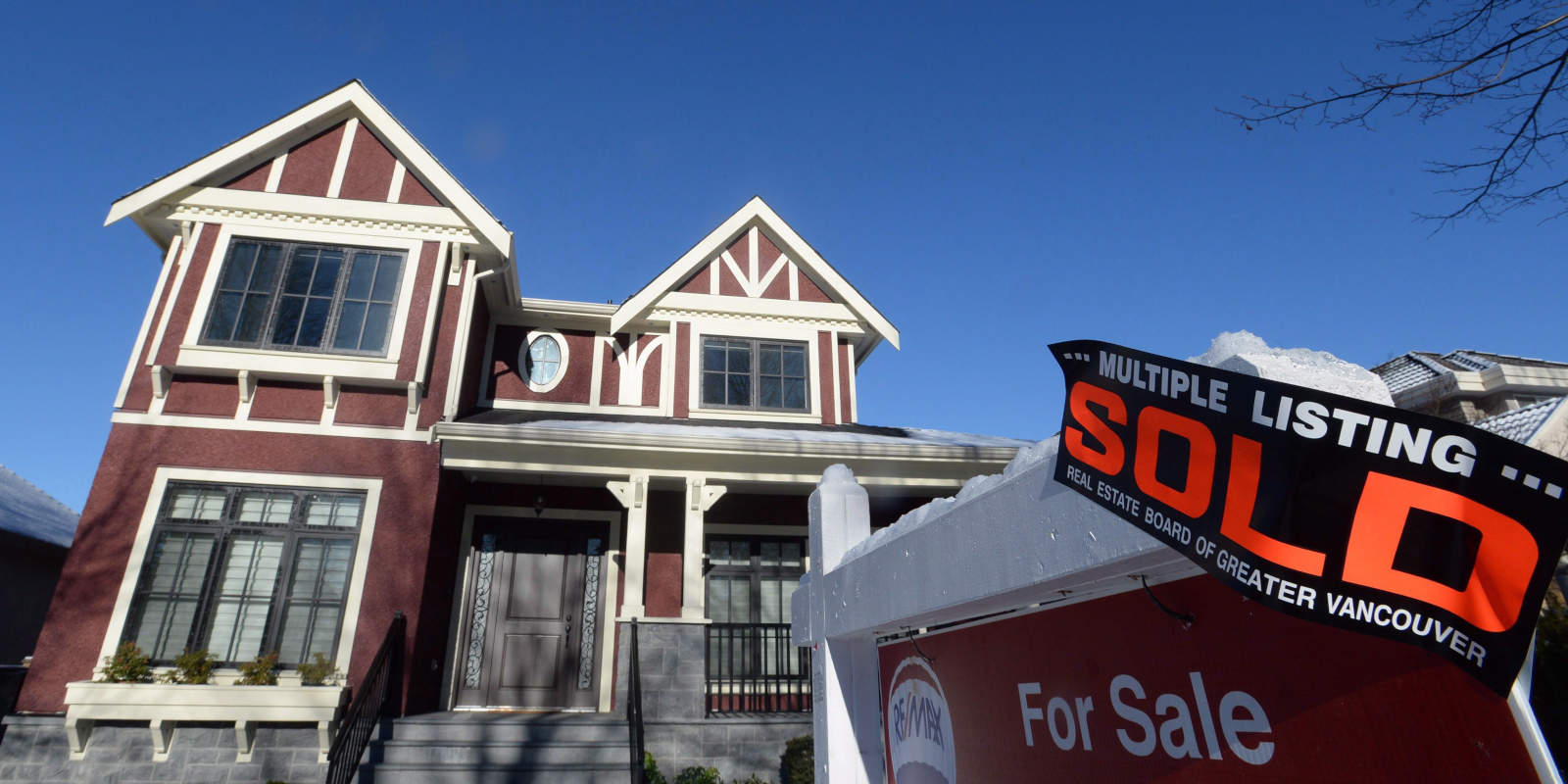How bad is Canada’s housing shortage right now? That depends how you measure it.
If you want to be generous, you can shield Canada from comparisons to similar countries and simply ask if we are building enough housing units to keep up with population growth.
Anyone trying to buy their first home in Vancouver, Toronto, Montreal, or Ottawa won’t need charts, graphs and reams of statistics to know the answer to that question.
The ratio of homes to people has been falling for years.
In 2016 there were 427 housing units for every 1,000 Canadians and in 2020 that number had fallen to 424, according to a recent report by Jean-François Perrault, a senior vice-president and chief economist at Scotiabank.
These numbers get even uglier when compared to other countries.
Canada has the lowest number of housing units per 1,000 residents of any G7 country, Scotiabank reports.

France has 540 housing units for every 1,000 residents, the U.K. has 433 and the U.S. has 427. If Canada set the modest goal of simply catching up to the United States, Canadian builders would have to complete an extra 100,000 homes. To catch up to the U.K., it would require an extra 250,000 homes.
To meet the G7 average, Canada would have to build two million extra units.
“To put these gaps in perspective, we have averaged 188,000 home completions in the last 10 years,” the Scotiabank report reads.
Although it’s tempting to attribute the current housing crunch entirely to a perfect storm brought about by the COVID-19 pandemic and record low interest rates, the historical record disagrees. It’s these shortages and the country’s inability to close the gap that are the main driver of record-high housing prices.
“It reflects a long-standing under-production of housing, whether for rent or purchase,” the report reads. This trend stretches across a decade and appears to be untethered from any other short-term trends.
And although housing starts have been off to a strong start in 2021, the problem is only going to get worse.
Although housing starts have been off to a strong start in 2021, the problem is only going to get worse.
Population growth, driven almost entirely by non-permanent residents has been a big factor and will continue to drive shortages as the pandemic tapers off. In Ontario, this is mainly driven by a huge increase in foreign students, according to Mike Moffatt, an economist at the Ivey Business School.
“We need to make sure they, and everyone else, in the province, has a place to call home,” wrote Moffatt, in a series of blog posts about housing issues in Ontario.
And with the federal government proposing to juice Canada’s immigration numbers and introduce a new national child-care system that will boost family incomes and increase the demand for housing, there isn’t much relief on the horizon.
“We know these things are coming. We should learn from the mistake of the last few years: we know demand will rise strongly… yet we also know that the supply response is likely to be hindered by a range of obstacles,” the Scotiabank report argues.
What are the solutions?
The paradox in the housing problem is that many short-term fixes provide temporary relief for some buyers and then exacerbate the problem on the whole. For example, in 2019 the federal government boosted the Home Buyer’s Plan and introduced a first-time home buyer’s incentive that critics argued would simply lead to more personal debt and inflated house prices.
The report from Scotiabank offers a few long-term solutions. The most obvious one is cash from the federal government to spur local governments. For example, the federal government could tie future transit funding to density objectives or to clearing red tape in the planning approval process.
The report also recommends that the federal government bring together people from across the country, including provincial and municipal officials, builders and developers, and civil society organizations to offer solutions on a short timescale.
Most of all, the report recommends that Canada’s housing issues be treated like a national priority, with resources that match the scale of the challenge.
Go West
While Canada’s housing problems sprawl across the country, leaving cities like Vancouver, Toronto and Montreal at the bottom of multiple affordability rankings, there are some places of refuge.
Edmonton is the highest ranked Canadian city on the Demographia international housing affordability index at 17th place and Calgary is similarly well-positioned at 29th out of 92 cities.
For perspective, Vancouver is second-last on the list, right before Hong Kong and four spots below Toronto.
Recommended for You

‘From elbows up to thumbs up’: The Roundtable on Mark Carney’s adventures in Washington

Richard Rooney: Uncertainty is the only thing Canada’s new prime minister can count on

David Polansky: Will Mark Carney really reverse course on a decade of Liberal mismanagement?

Mark Harding: Doug Ford’s actions speak louder than his words



